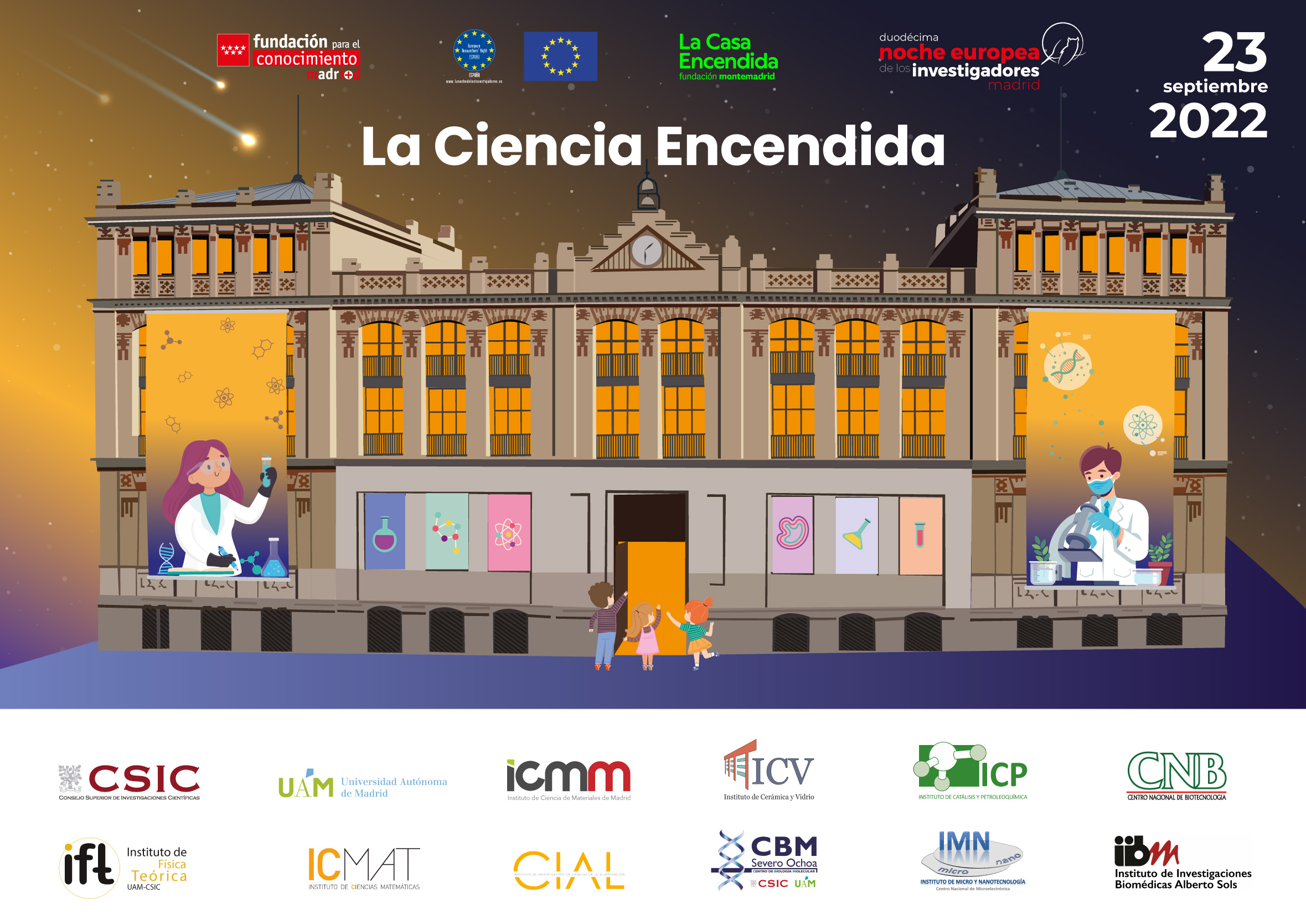
La mañana del viernes 23 de septiembre de 2022 los centros del Consejo Superior de Investigaciones Científicas (CSIC) del campus de Cantoblanco nos vamos a La Casa Encendida con un preevento de la Noche Europea de los Investigadores e Investigadoras. Calentaremos motores para la noche más científica del año con talleres científicos impartidos por personal de estos centros y una yincana sobre mujeres Nobel.
La actividad está dirigida a estudiantes desde 5º de Primaria a 2º de Bachillerato que disfrutarán de varios talleres de Física, Química y Ciencia de Materiales impartidos por especialistas y adaptados a la edad y conocimientos de cada grupo.
Dos turnos:
10-12 horas: Primaria (5º, 6º)
12-14 horas: ESO (3º, 4º) y Bachillerato
AFORO COMPLETO
Centros CSIC participantes: Instituto de Ciencia de Materiales de Madrid (ICMM), Instituto de Catálisis y Petroleoquímica (ICP), Centro Nacional de Biotecnología (CNB), Instituto de Investigación en Ciencias de la Alimentación (CIAL), Instituto de Cerámica y Vidrio (ICV), Instituto de Ciencias Matemáticas (ICMAT), Instituto de Física Teórica (IFT), Instituto de Micro y Nanotecnología (IMN), Instituto de Biología Molecular (CBM), Instituto de Investigaciones Biomédicas “Alberto Sols” (IIBM).
La Casa Encendida
Ronda de Valencia 2, 28012 Madrid.
Para más información:
— Actividades —
Yincana
Escape Road: A la búsqueda de las científicas Nobel y No Nobel.
Yincana basada en una exposición sobre investigadoras que han ganado el premio Nobel en disciplinas científicas, o sus equivalentes en Matemáticas (Premio Abel y Medalla Fields). Se dividirá al alumnado en grupos que competirán entre sí resolviendo preguntas en torno a la exposición. También se les darán a conocer otras investigadoras relevantes a las que se negó el reconocimiento de sus contribuciones.
Talleres de divulgación científica (Primaria y ESO/Bachillerato)
Jugando con la luz (ICMM, Primaria).
La luz está presente en todos los aspectos de la vida y su uso es necesario y útil para multitud de cosas. En este taller aprenderemos a manejar la luz utilizando espejos, lentes, velas… y construiremos algún que otro aparato relacionado con ella, como un telescopio o una cámara oscura. Poneos las gafas de sol, porque lo que veréis os deslumbrará. Impartido por: Alvaro Blanco.
Descontaminando con materiales naturales... ¿con arcilla y algas? (ICMM, Primaria).
Diseñaremos un bioabsorbente combinando dos componentes naturales (biopolímero+arcilla). Se encapsulará la arcilla (sepiolita) en el polisacárido (alginato) para crear microesferas híbridas y eliminar un contaminante del agua. Impartido por: Eva García Frutos, Margarita Darder.
Minería urbana: Destripando y reciclando baterías de ión Litio (ICMM, ESO/Bachillerato).
Exploraremos cómo es por dentro una batería de ión Litio, las más habituales en nuestros teléfonos móviles, y el proceso que hemos desarrollado para reciclar los metales (Li y Co) que componen el cátodo de la batería. Impartido por: Conchi Gutiérrez, Marisa Ferrer.
Y la química dijo: hágase la luz (ICMM, ESO/Bachillerato).
Comprenderemos los fenómenos de fluorescencia, fosforescencia y quimioluminiscencia. Recrearemos la reacción de quimioluminiscencia (con luminol u oxalatos) que se produce en un tubo de luz. Impartido por: Iñigo Bretos.
Superconductividad, un fenómeno fascinante (ICMM, Primaria, ESO/Bachillerato).
Nos acercaremos al fascinante fenómeno de la levitación de un superconductor y sus propiedades magnéticas y eléctricas. Física cuántica que puedes ver para tener trenes súper-rápidos y seguros, y muchas cosas más. Impartido por: Leni Bascones, Maria José Calderón.
¿Es un vidrio o un cristal? (ICV, Primaria, ESO/Bachillerato).
Aprenderemos a diferenciar los cristales de los vidrios, descubriremos el secreto de la invisibilidad a través de sus propiedades e incluso podremos fabricar nuestros propios vidrios y cristales. Impartido por: Teresa Palomar, David González.
Cerámicas 4.0, más allá del botijo (ICV, Primaria, ESO/ Bachillerato).
Descubriremos cómo se fabrican los materiales cerámicos a través de diferentes técnicas de procesamiento e investigaremos algunas de sus propiedades más excepcionales. Impartido por: Cecilia Granados, Alberto Moure, Teresa Jardiel.
Juego de los catalizadores (ICP, Primaria, ESO/Bachillerato).
Con este juego aprendemos cómo nuestra vida diaria depende de los catalizadores (tanto de origen mineral como biológico): desde la gasolina a muchos plásticos, pasando por numerosos alimentos y medicamentos e, incluso, los procesos de descontaminación. Cada visitante recibe cuatro ‘imanes’ con diversas imágenes y tiene que colocarlos sobre un panel indicando cuál es la materia prima, el catalizador, el producto y su aplicación. El panel indica mediante señales luminosas si la secuencia es correcta o no. Impartido por: Antonio López, Ana Serrano, Laura Martínez.
La pila de Hidrógeno (ICP, Primaria).
Describiremos las bases de la tecnología energética basada en el hidrógeno y las pilas de combustible, y mostraremos el funcionamiento de dos prototipos en miniatura. Además realizaremos una demostración visual de los parámetros asociados con la seguridad del uso del hidrógeno. También utilizaremos medios audiovisuales para aclarar algunos conceptos erróneos relacionados con esta tecnología. Impartido por: Miguel Peña, Jorge Moral, Diana García.
El gran juego de la Tabla Periódica (ICP, ESO/Bachillerato).
Mediante el uso de una Tabla Periódica de 2 metros de ancho y 1 metro de alto construida en madera, tendremos que reconocer los elementos químicos basándonos en su símbolo e intentar ubicarlos en su posición en la Tabla. Elementos químicos en esferas de madera de 40 mm pintadas en diferentes colores: azul (metales), amarillo (no metales), rojo (metales de transición) y verdes (lantánidos y actínidos). Impartido por: Marcos Pita, Laura Martínez.





